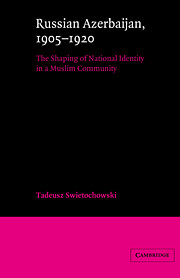Book contents
- Frontmatter
- Contents
- Preface
- Maps
- 1 A century of Russian rule
- 2 The 1905 Revolution and Azerbaijani political awakening
- 3 The era of war and revolutions: ideologies, programs, and political orientations
- 4 Transition to nationhood: in quest of autonomy
- 5 Transition to nationhood: Transcaucasian federalism
- 6 The Azerbaijani nation-state
- 7 The coming of Soviet power
- Conclusion
- Abbreviations
- Notes
- Bibliography
- Index
6 - The Azerbaijani nation-state
Published online by Cambridge University Press: 12 January 2010
- Frontmatter
- Contents
- Preface
- Maps
- 1 A century of Russian rule
- 2 The 1905 Revolution and Azerbaijani political awakening
- 3 The era of war and revolutions: ideologies, programs, and political orientations
- 4 Transition to nationhood: in quest of autonomy
- 5 Transition to nationhood: Transcaucasian federalism
- 6 The Azerbaijani nation-state
- 7 The coming of Soviet power
- Conclusion
- Abbreviations
- Notes
- Bibliography
- Index
Summary
The Ottoman tutelage
Upon the dissolution of the Transcaucasian Federation the Muslim representation in the defunct Seim constituted itself into the Azerbaijani National Council and on May 28, 1918 proclaimed that a new nation was born. The proclamation, which was to be referred to later on as the National Charter, read as follows:
Azerbaijan is a fully sovereign state; it consists of the southern and eastern parts of Transcaucasia under the authority of the Azerbaijani people.
It is resolved that the form of government of the independent Azerbaijani state is a democratic republic.
The Azerbaijani Democratic Republic is determined to establish friendly relations with all, especially with the neighboring nations and states.
The Azerbaijani Democratic Republic guarantees to all its citizens within its borders full civil and political rights, regardless of ethnic origin, religion, class, profession, or sex.
The Azerbaijani Democratic Republic encourages the free development of all nationalities inhabiting its territory.
Until the Azerbaijani Constituent Assembly is convened, the supreme authority over Azerbaijan is vested in a universally elected National Council and the provisional government responsible to this Council.
So far only a geographical reference, Azerbaijan now became the name of a state, and some 2 million people, called variously Tatars, Transcaucasian Muslims, and Caucasian Turks, officially became Azerbaijanis. The very use of this name by a state with no clearly defined borders would soon bring objections from Persia.
- Type
- Chapter
- Information
- Russian Azerbaijan, 1905–1920The Shaping of a National Identity in a Muslim Community, pp. 129 - 164Publisher: Cambridge University PressPrint publication year: 1985
- 2
- Cited by

